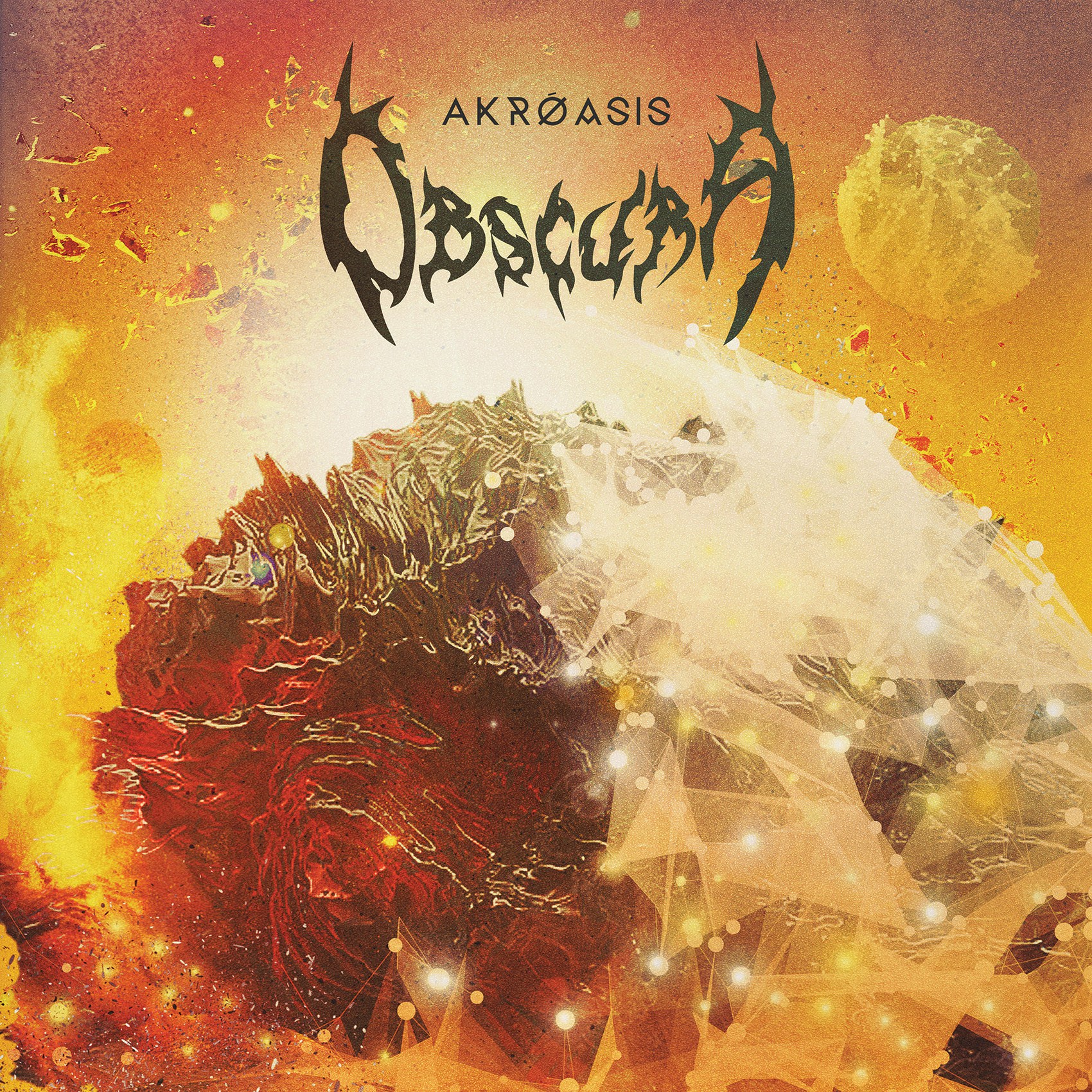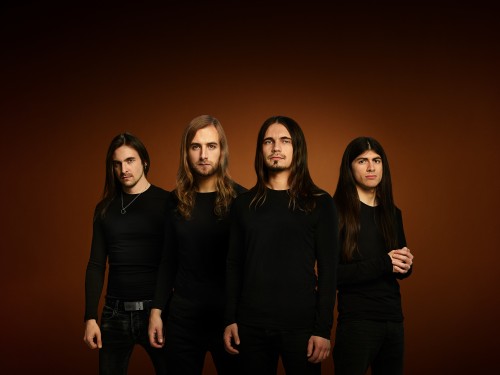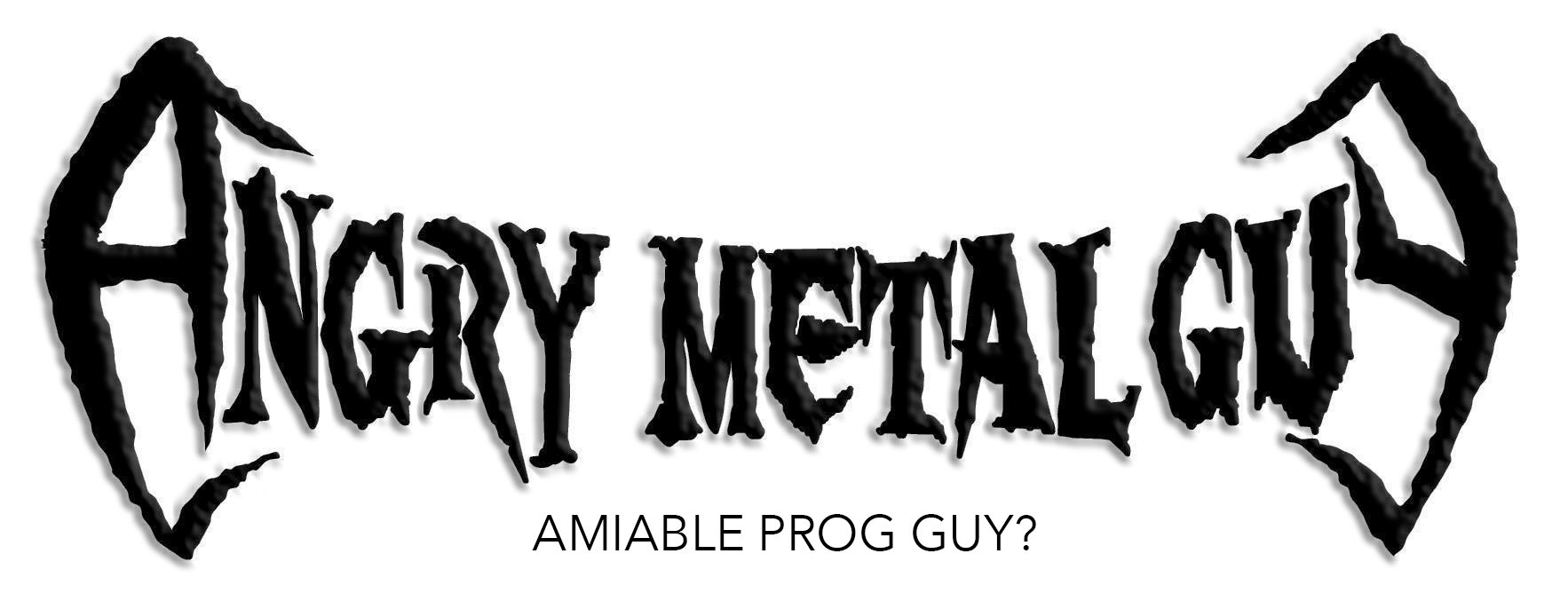 “What now?” That’s the question Akróasis, unfairly or otherwise, is supposed to answer. Obscura in 2016 is solely within the hands of founder, guitarist, and vocalist Steffen Kummerer. With the core of the band as we knew it between Cosmic Genesis and Omnivium gone—and that’s an impressive list: Hannes Grossman on drums, Jeroen Paul Thesseling on bass, and Christian Münzner on guitars—Akróasis is a moment for a new statement of intent. Kummerer isn’t dropping that statement of intent short-handed, of course, having found himself an extremely talented band; with Linus Klausenitzer manning the fretless, Sebastian Lanser manning the kit, and Rafael Trujillo playing guitar.1 With this formidable group of musicians at their posts, Akróasis is loaded for bear with all the talent necessary to deliver a vigorous argument about the band’s future.
“What now?” That’s the question Akróasis, unfairly or otherwise, is supposed to answer. Obscura in 2016 is solely within the hands of founder, guitarist, and vocalist Steffen Kummerer. With the core of the band as we knew it between Cosmic Genesis and Omnivium gone—and that’s an impressive list: Hannes Grossman on drums, Jeroen Paul Thesseling on bass, and Christian Münzner on guitars—Akróasis is a moment for a new statement of intent. Kummerer isn’t dropping that statement of intent short-handed, of course, having found himself an extremely talented band; with Linus Klausenitzer manning the fretless, Sebastian Lanser manning the kit, and Rafael Trujillo playing guitar.1 With this formidable group of musicians at their posts, Akróasis is loaded for bear with all the talent necessary to deliver a vigorous argument about the band’s future.
Akróasis, like Cosmogenesis, is at its best when it is a driving, riffy endeavor. Tracks like “Ten Sepiroph” and “Ode to the Sun” show off the power of Obscura’s riffs in unique ways. The former demonstrates the legato, 16th note riffing, something akin to Anata or Necrophagist; the bread and butter of tracks like “Anticosmic Overload.” The latter, on the other hand, shows the power in well-placed chug and simplicity, both of which are in short supply on most technical death metal records. All of the songs on here feature absolutely sick riffs. “Perpetual Infinity” has riffs that are like Obscura interpreted by Cynic. This description first occurred to me on opening “Sermon of the Seven Suns,” and given Kummerer’s liberal use of vocoder and fusion ‘breakdowns’ throughout, the phrase applies quite broadly. And I dug it.
But the more I listen to Akróasis, the more the writing feels like a mis-prioritization of form over function. Obscura makes complex, dynamic and interesting music. They’ve done this on every record. However, the goal seem to be to become more complex with each record, particularly as the scope of the songwriting has expanded. Cosmogenesis, in many ways, is a very ‘straight’ album; while Omnivium is an album expansive in its songwriting, but unwieldy. Akróasis continues in Omnivium’s footsteps in a way I never would have expected. Not only is the songwriting more expansive—see 15 minute closer “Weltseele”—but the songs don’t feel tight; they feel almost embryonic. Rather than being a record driven by a clear vision, Akróasis is an album which winds its way forward with an awkward lurch at times. “Weltseele” is the perfect distillation of this. Until the melody that leads the album out is introduced at the 10-minute mark, no single idea is developed for longer than what feels like a few seconds. Riff after idea after riff is thrown into the song—moving ostensibly toward some kind of epic build—but there’s no locomotion; it’s all just tumbling toward a conclusion, unformed and confused.

A sense of directionlessness is what bothers me about Akróasis as a whole, but the whole album isn’t like this. Rather, each song displays moments of it in its own way. For example, in opener “Sermon of the Seven Suns,” the band inserts slight time hiccups which are kind of cool, but feel a bit superfluous; “tech” for the sake of “tech”; form above function. This isn’t, of course, always a bad thing. “The Monist” features some really slopey, misfitting bass work from Klausenitzer (who is the record’s highlight), which takes the song next level along with impressive guitar wizardry. “Fractal Dimension” features a similar tendency toward swooping basslines under staccato rifferation, and the slightly off interplay between the guitars mixed Left and Right add to a destabilizing feel. But these moments can also rob songs of their forward drive; “Ten Sepiroth” is a burner, but rather than throwing out a 4 minute song with slick riffs and extremely impressive fretless gymnastics, the song’s vestigial acoustic part knocks the winds out of its sails.
As a whole, Akróasis sounds well-balanced. The tonality of fretless bass is surprisingly well-suited to the mixing of hypercompressed masters in modern death metal. I love the way that Klausenitzer’s bass sounds, and by moving the bass from the lowest frequencies—where it competes with the kick drum—fretless helps to overcome one of the key challenges faced by producers. But back-to-back with Cosmogenesis I was surprised at how much more pop 2009’s DR5 had compared to 2016’s DR6 (level matched, of course), which actually sounded a bit flat in comparison.
In totality, Akróasis is a frustrating record, but it’s alright. Its best moments are when the band sheds pretense, knocking out virtuoso performances and writing riffs that stick. I’ll take “Ode to the Sun,” “Ten Sepiroth,” and “Fractal Dimension” and enjoy the hell out of them going forward. But like Omnivium before it, this record collapses under its own weight. Unlike most progressive albums, I’ve actually started appreciating this album less with each listen. At first I was superficially impressed by what appeared to be a growing sophistication in the band’s approach. But with each listen the songs feel more superficial and contrived. Ultimately, Akróasis puts form above function; and while the answer to the question of “What now?” may be beautiful at times, it’s a shallow response.
Rating: OK
DR: 6 | Media Reviewed: 320 kbps mp3
Label: Relapse Records
Websites: realmofobscura.com | facebook.com/RealmofObscura
Out Worldwide: February 5th, 2016

















